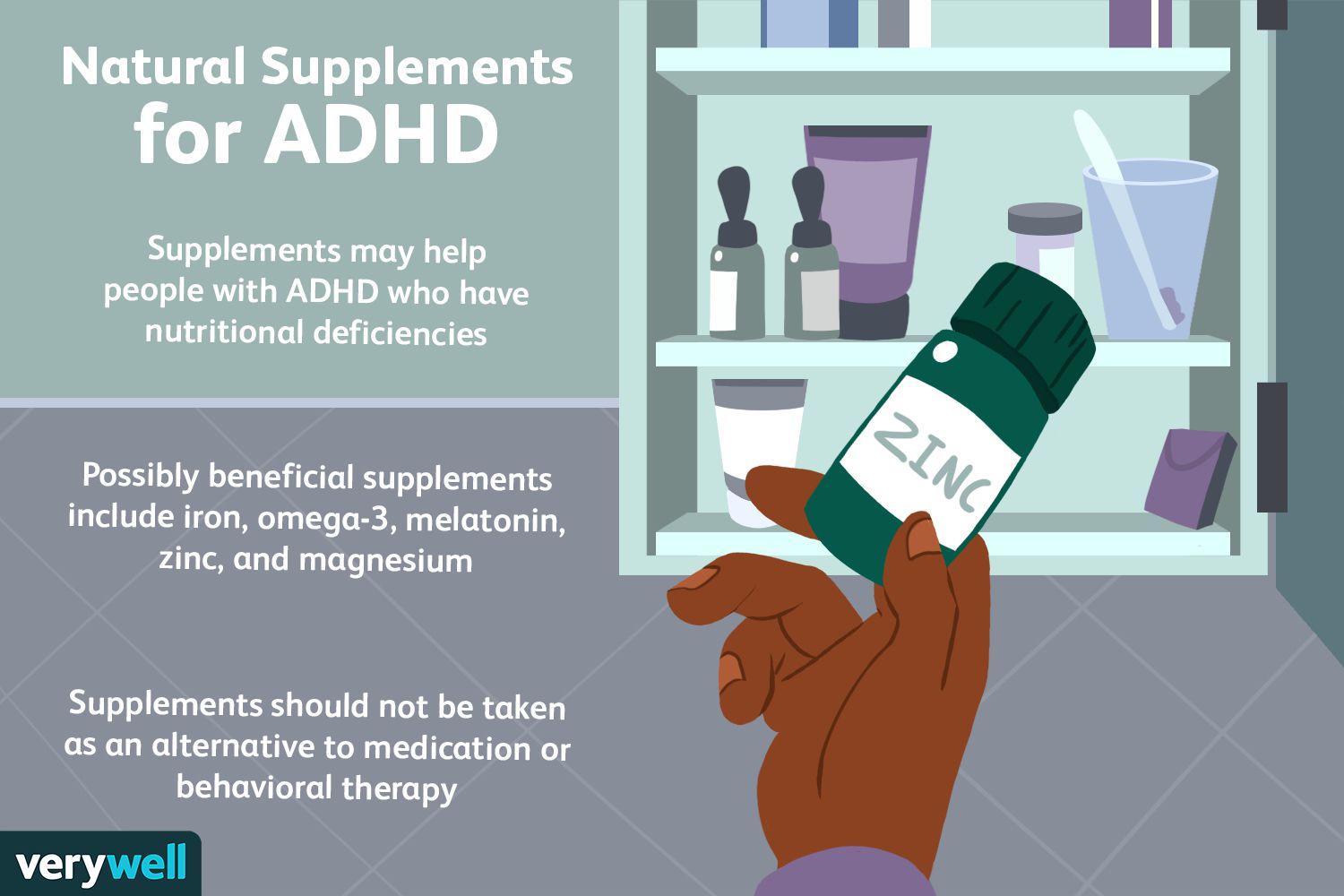Many people wonder: Do natural supplements work for ADHD? As concerns grow over side effects from prescription medications, more parents and adults are exploring natural supplements for ADHD as alternative or complementary treatments. While these supplements aren’t a cure, scientific evidence and anecdotal experiences suggest they may ease certain symptoms like inattention, hyperactivity, and emotional dysregulation—especially when used alongside lifestyle changes and behavioral therapy.
Why Consider Natural Supplements for ADHD?
Concerns Over Medication Side Effects
Stimulants like Adderall and Ritalin are widely used to treat ADHD, but they’re not for everyone. Common side effects include:
-
Sleep disturbances
-
Appetite suppression
-
Anxiety
-
Mood swings
Because of these, many seek natural supplements for ADHD that can help with fewer risks.
Holistic and Long-Term Health Approach
Natural supplements often align with a holistic ADHD management plan, which includes diet, sleep hygiene, exercise, and mindfulness—all of which support brain function and emotional regulation.
Top Natural Supplements for ADHD
Omega-3 Fatty Acids (Fish Oil)
Omega-3s, particularly EPA and DHA, are among the most researched natural supplements for ADHD. They support brain development and help reduce inflammation.
Benefits:
-
Improved focus and memory
-
Reduced hyperactivity
-
Enhanced mood stability
Clinical studies show that higher EPA levels are especially effective for ADHD symptoms.
Zinc
Zinc is essential for dopamine regulation—a neurotransmitter critical in ADHD. Studies show that children with ADHD often have lower zinc levels than average.
Supplementing zinc may:
-
Improve attention
-
Reduce impulsivity
-
Support neurotransmitter function
Typical dosage: 10–20 mg daily (under medical supervision)
Magnesium
Magnesium is known as a calming mineral. Low magnesium levels are linked to irritability, restlessness, and poor concentration.
Why it helps:
-
Promotes calmness
-
Enhances sleep
-
Reduces anxiety
It can be taken as a supplement or absorbed via Epsom salt baths.
Iron (Ferritin)
Iron is essential for dopamine synthesis. Low ferritin levels are common in children with ADHD, and research shows supplementation improves attention in iron-deficient individuals.
Important: Always test iron levels before supplementing to avoid overload.
L-Theanine and Green Tea Extract
L-Theanine is an amino acid found in green tea that promotes relaxation without sedation. Combined with small amounts of caffeine, it can help improve:
-
Alertness
-
Focus
-
Emotional regulation
It’s considered safe and is used in many natural ADHD supplement blends.
Herbal Remedies for ADHD
Ginkgo Biloba
Known for enhancing memory and cognitive function, Ginkgo may offer mild benefits for those with ADHD, especially in combination with Ginseng.
Potential benefits:
-
Better concentration
-
Improved mental processing
-
Reduced distractibility
Bacopa Monnieri
This Ayurvedic herb supports memory, learning, and attention span. Some small-scale studies suggest Bacopa may improve cognitive function in children with ADHD.
Rhodiola Rosea
Rhodiola is an adaptogen—an herb that helps your body manage stress. It may indirectly benefit people with ADHD by reducing fatigue and boosting mental performance.
Are Natural Supplements for ADHD Effective?
What the Research Says
The research on natural supplements for ADHD is promising but still limited compared to pharmaceutical studies. Some supplements—like omega-3s and zinc—have a stronger evidence base, while others rely more on user testimonials and preliminary trials.
Individual Results May Vary
Not every supplement works for every person. Factors like genetics, diet, sleep quality, and other health conditions all influence how effective a supplement may be.
Safety and Precautions
Consult a Healthcare Provider
Before adding any supplement, especially for children, consult a physician or licensed naturopath. Even natural supplements can interact with medications or be harmful if dosed incorrectly.
Choose Quality Products
Always use third-party tested supplements from reputable brands. Look for certifications like NSF, USP, or GMP.
Start Small and Track Progress
Introduce one supplement at a time and monitor changes in symptoms, mood, sleep, and focus. Keep a journal or use an ADHD tracker app.
Avoid “Mega Doses” and Unverified Claims
More is not always better. High doses of certain vitamins or herbs may do more harm than good. Be cautious of products claiming to “cure” ADHD—natural supplements are supportive, not curative.
Start Low and Go Slow
Begin with the lowest recommended dose to gauge tolerance. Monitor for any side effects, such as digestive issues, irritability, or changes in sleep. Gradual introduction helps determine effectiveness without overwhelming the system.
Track Progress and Adjust Accordingly
Use a symptom tracker, journal, or mobile app to monitor changes in:
-
Focus and attention
-
Sleep quality
-
Emotional regulation
-
Hyperactivity levels
This helps determine whether the supplement is helpful or needs adjusting.
Combining Supplements With ADHD Treatment
Not a Substitute for Medical Care
While helpful, natural supplements for ADHD are best used as part of a comprehensive treatment plan. They do not replace diagnosis, therapy, or prescribed medications.
Complementary Behavioral Strategies
Maximize supplement benefits with:
-
Cognitive-behavioral therapy (CBT)
-
Executive function coaching
-
Time management tools
-
Positive reinforcement strategies
Final Thoughts
Do Natural Supplements Work for ADHD?
The answer is: yes, for some people. While they won’t “cure” ADHD, many natural supplements can ease symptoms and improve quality of life when used correctly. The key is to take an informed, personalized, and cautious approach.
If you’re exploring natural supplements for ADHD, begin with evidence-backed options like omega-3s, zinc, and magnesium. Work with your healthcare provider to find a safe, effective strategy that fits your lifestyle and health needs.
